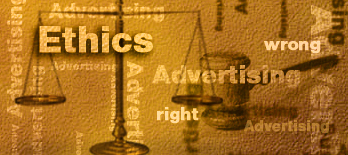Allison Pierce
ap287120@ohio.edu
Arguably, one of the most consistent and important values seen throughout
ethics is truthfulness, specifically found in journalism. While the need for
truth is imperative to journalists alike, it is most useful in the advertising
field, as it is used to build the bridge between client and audience. Without
it, not only will the product or service fall flat, but the company or
creator’s reputation is also at risk. Advertisers and public relation
professionals face many moral and ethical decisions, but need to abide by their
code of ethics for maximum potential and success.
For
example, the first of the principles, set forth by the American Advertising
Federation, states that “Advertising, public relations, marketing
communications, news, and editorial all share a common objective of truth and
high ethical standards in serving the public.” That is, that each of these
values providing honesty and accuracy consistently, to their consumers.
Similarly, found in the PRSA Code of Ethics, honesty is also one of their core
principles. This transparency opens the door to building onto the relationship
through other values, such as loyalty, integrity, and public trust.
Being that we live in a digital world, it’s easier than ever for these
professionals to connect with their customer base. Through likes, comments, and
shares, their target audience can be easily, well, targeted. However, with this
in mind, it’s even more critical that these codes are being upheld, as honesty
is key, and one small blunder can go viral. In fact, as mentioned in this blog, an Aflac consumer behavior study that found roughly 75% of consumers reported that they would boycott a brand that was not socially conscious.
Although some advertisements and campaigns teeter between ethical and
unethical, I believe that most industry professionals regularly follow the
codes. While this alone can work successfully, a large emphasis should be
placed on not only how the message comes across, but to whom. This article, detailing the
fine line between ethics states that, "Ethical marketing is real and can
add significant value by matching the right ad with the right product, with the
right audience at the right time." The fifth principle, from the AAF, also mentions an intended audience, and that the advertisers should treat them fairly based on that intention.
Ultimately,
if the producers stay true to not just their words, but their clientele, I
believe that they would have a higher chance of success.

No comments:
Post a Comment